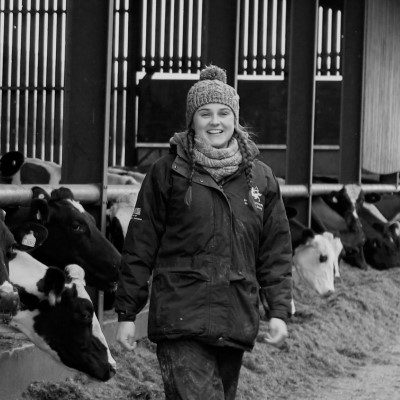CIEL | Blog: Exploring the link between animal health and the climate crisis
Imogen Taylor

The health and welfare of farmed animals is a key area of research for the University of Edinburgh’s Roslin Institute, a founding academic partner in the CIEL research alliance. This blog highlights the Institute’s contributions towards mitigating the impact of livestock on climate change through their work tackling the most challenging animal diseases.
Infectious diseases are a huge threat to Net Zero agriculture as they are directly associated with high rates of mortality of farmed animals and with an increase in resources utilised to maintain a high health status. This includes the use of antibiotics, which in turn exerts pressure for transmissible drug resistance that can later affect the treatment of human diseases.
Infectious diseases
Much of Roslin’s research focuses on the development, evaluation, and implementation of innovative solutions to infectious disease control. These range from genetic tools to breed animals that are genetically more resistant or resilient to infections, development and evaluation of safe and effective veterinary vaccines, improved diagnostics, and data-driven epidemiological tools to predict disease spread and aid decision-making.
Examples include identification of a marker for resistance of salmon to infectious pancreatic necrosis, which since being selected in breeding schemes is estimated to have averted the deaths of up to 18 million salmon, saving farmers and producers up to £234m between 2013 and 2020. As the carbon footprint of salmon is estimated to be 11.9kg CO2 per kg of consumed food, this impact equates to hundreds of millions of kilograms of CO2 saved.
Roslin scientists have also demonstrated the potential of genome editing in control of devastating animal diseases. For example, precise removal of part of a gene in pigs confers complete resistance to the virus that causes porcine reproductive and respiratory syndrome (#PRRS) in pigs, without harming the animals. PRRS exerts substantial welfare and economic costs globally. The research now continues with industry partners to obtain regulatory approval for such animals to be used in food production and work with the public and not-for-profit organisations to explain the technology.
Removing the loss of millions of pigs from the global supply chain by mitigating PRRS will have a huge climate impact, removing unnecessary GHG emissions associated with pigs that die before entering the food chain. Similar advances are in the pipeline for avian influenza and other diseases.
Discover more about Roslin Institute contributions towards mitigating the impact of livestock on climate change here


Imogen Taylor, Marketing and Communications Manager
Imogen leads on communications for CIEL and brings more than a decade of marketing experience within agrifood. Outside of marketing, previous roles have included managing analytical training for scientists from across international markets concerned with exporting foods to Europe, and as a research scientist specialising in the detection and control of invertebrate pests.
Email: [email protected] | Phone: 01904 567716







